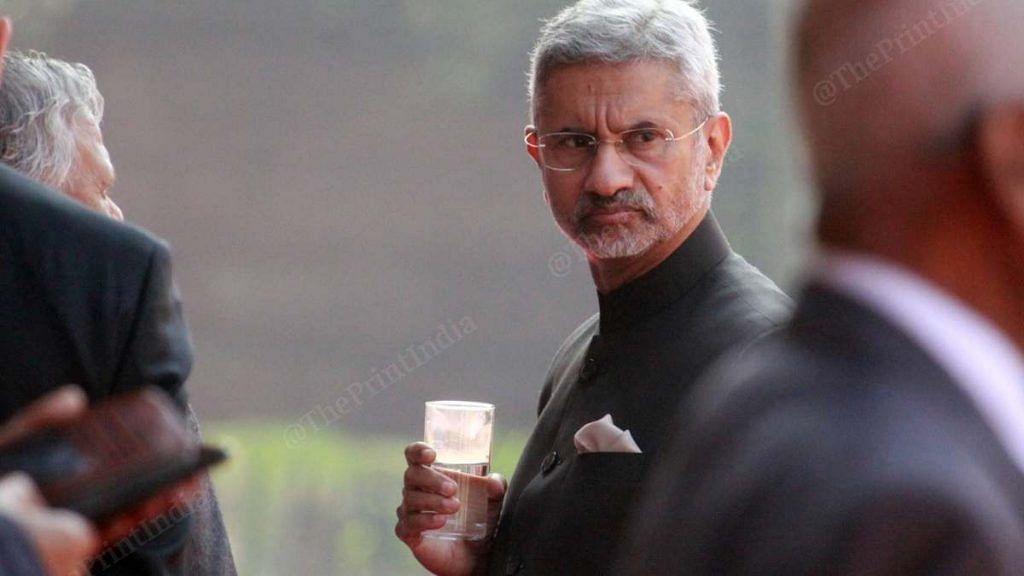In Prime Minister Narendra Modi’s second term, External Affairs Minister S. Jaishankar has turned out to be his silver bullet on the foreign policy front, splendidly managing one crisis after another, even as he lends his extraordinary intellect and pragmatic spine to the ruler in Delhi.
Of course, Home Minister Amit Shah remains the PM’s foil, counterfoil and everything in between. National Security Adviser Ajit Doval has been associated with the BJP for some time and his hands-on experience as a former Intelligence Bureau (IB) chief has been instrumental in managing the Modi government’s biggest national security challenge in the second term — how to pacify Kashmir.
But there is now a new rising star on the BJP block and his name is Subrahmanyam Jaishankar.
From pulling off the biggest image-building exercise for PM Modi in recent times — the “very successful” visit by US President Donald Trump, travelling to Srinagar to ensure that all negative coronavirus Kashmiri students recently returned from Iran were nicely settled, Sunday afternoon’s teleconference between Modi and other SAARC leaders – Jaishankar has managed them all while doggedly staying in the background.
Also read: US and Russia hail Modi’s video-conference with SAARC leaders over coronavirus
The big visit
Let’s start with the Trump visit. All those who asked “what India got” missed the main point, which is that all politics, both foreign or domestic, is primarily about communicating how you achieve your goals.
As Modi delivered the biggest welcome party to the world’s most powerful and controversial leader in Ahmedabad, and as the Trumps hung out at the Taj Mahal and then in Delhi, Jaishankar ensured that the Modi message was identified with the most positive spin. He couldn’t help the riots that broke out that evening in Delhi, of course.
This week, for the second time in eight months, since the dilution of Article 370, Modi has been caught plumb in the middle with his second biggest foreign policy challenge — how should India deal with the coronavirus pandemic.
Also read: MEA set to brief foreign envoys on coronavirus, will allay concerns over travel advisory
The bigger problem
On Sunday afternoon, in an initiative that smelt and sounded like the 2014 invitation to all SAARC leaders for Modi’s swearing-in, Modi spoke to the leaders of South Asia, save Pakistan Prime Minister Imran Khan, on how to deal with the COVID-19 emergency.
The PM has the right idea. India is too closely intertwined with the rest of the region to deal with a major health care crisis on its own. After all, viruses don’t need visas to cross borders.
Jaishankar understands that crises are the bedrock of opportunities. So, one day before finance ministers of the European Union conducted a teleconference on the same subject, India activated hot lines across South Asia.
Bangladesh Prime Minister Sheikh Hasina, Maldives President Ibu Solih, Afghan President Ashraf Ghani, Nepal Prime Minister K.P. Oli, Bhutan Prime Minister Lotay Tshering and Sri Lankan President Gotabaya Rajapaksa were on the other end of the video line. Imran Khan sent his special advisor on health Zafar Mirza, who came off looking terribly churlish when he raised the Kashmir lockdown in the middle of the discussion, although he covered it up by saying that health measures should apply to the Union Territory too.
Also read: Modi govt’s domestic politics hurting India’s ties abroad. But not as badly as critics say
Leadership show
It was a superb – if scandalously boring—effort. In any case, the leaders were reading off statements that their bureaucrats had prepared and nothing was new. The truth is that it was not intended to be anything else.
What was intended was a demonstration of Modi’s leadership, that he will not only lead India, but that India will lead the South Asian region under his charge – irrespective of what Pakistan has to say about Kashmir, which is a done deal, anyway.
Certainly, the coronavirus pandemic has become Modi’s biggest foreign policy challenge too. China’s Xi Jinping was roundly criticised for shutting down Wuhan and some other cities in the early weeks to contain the virus but he has been proved right in hindsight. Xi’s authoritarian decision bought the world time and none other than WHO has recognised it.
On the other hand, India remains beset, at least in the international press, with the image of a poverty-ridden, Third World country thatcannot even control a communal riot in its backyard. Former Goldman Sachs chief Jim O Neill’s comment that he’s glad the “virus didn’t start in India” hits uncomfortably close to the truth.
So what does Modi do? Remember that the PM has stated several times that India will take charge of all Indians all over the world. His massive diaspora efforts, which have become parallel foreign policy instruments, are part of this universe. As the virus travelled across the world, and Indians began to fall sick or prey to panic, Modi knew his work was cut out.
Also read: MEA appoints COVID Coordinator to streamline global efforts on coronavirus
Enter Jaishankar
From airlifting Indian students in Wuhan and sending a medical team to Italy to give positive or negative coronavirus certificates to Indians there, to sending a medical team to the Maldives, the foreign office has attempted to portray a softer and kinder government that takes care of its own.
But there was a larger message in the works as Modi sat across the video line with the leaders of South Asia on Sunday afternoon: I am, the PM implied, also willing to take care of your citizens too.
Views are personal.
